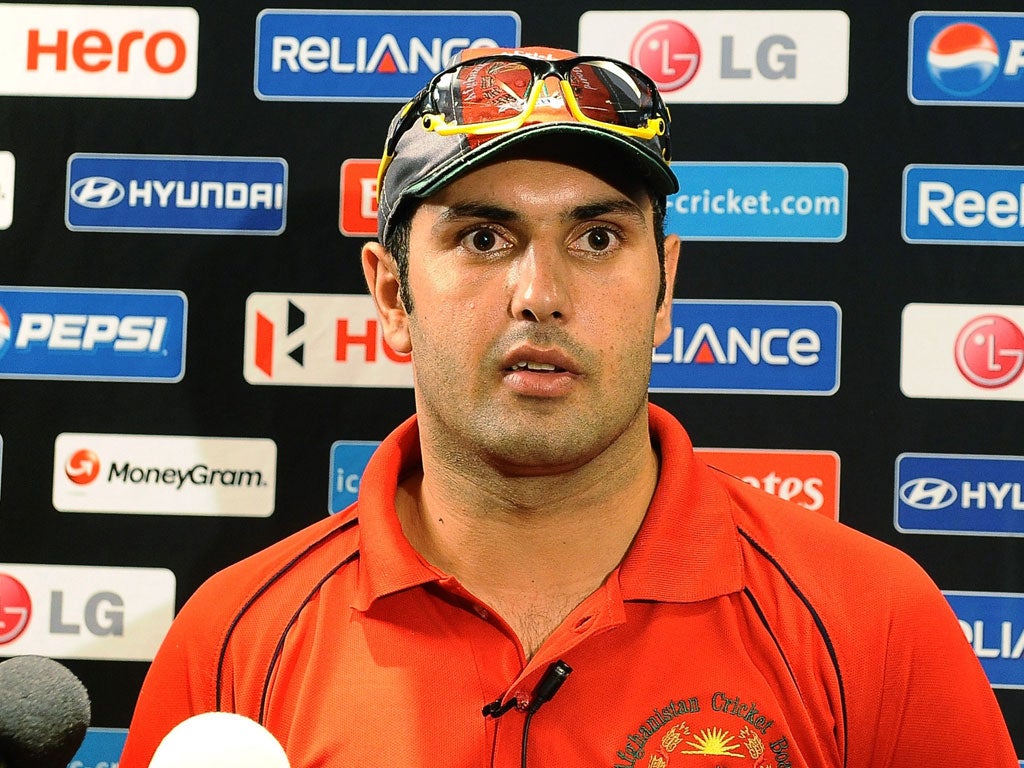World Twenty20: Afghanistan's 'bus stop boys' find cricket is just the ticket

On a bus stop somewhere close to the border in the North West Frontier a notice was pinned. "All those who want to play cricket for the Afghanistan team," it said, "please meet here in three months' time." And look what happened.
This charming tale may not be wholly accurate but it still faithfully represents the story of Afghan cricket: from nowhere to the big time in 10 years. Tonight in the steamy heat of Colombo, Afghanistan will play England in the World Twenty20.
England are the champions and much else besides in the chequered history of Afghanistan. Victory, by no means unthinkable, would prompt an outpouring of jubilation at home perhaps never seen before.
It is all but impossible to overstate what cricket has come to mean in this country. Started largely by refugees who had sought sanctuary in Pakistan where they first discovered the sport, it has swept the nation.
"Afghanistan is a country where there are no pop stars or fantastic politicians, no one that the people can look up to," said Dr Sarah Fane. "Then along came these cricketers who have given the country a place in the world it never had. They are all heroes."
Dr Fane has been visiting Afghanistan since the Eighties, the time of the Soviet Union invasion and in spiritual terms she has never left. She founded the charity, Afghan Connection, which has twin main objectives in education and cricket. Its alliance with MCC has been instrumental in the spreading of cricket.
While the majority of the team in Sri Lanka learned about the game in Pakistan, the breathtaking scope of its spread gives genuine hope that they will remain competitive.
Affiliated to the ICC in 2001, they were playing in the Fifth Division of the World Cricket League as recently as 2008. They cut a swathe through opponents and first sprang to global prominence by qualifying for the 2010 World Twenty20.
It was clear in their 23-run defeat by India in the first match this year – they won seven straight games in qualifying – that they know what they are doing. Hamid Hassan, their reverse swing specialist fast bowler, was sadly injured after spending the summer training at Lord's. But there were others who swashbuckled with abandon from Mohammad Shahzad to Mohammad Nabi, a former member of MCC's groundstaff along with Alex Hales, one of his opponents tonight. Some of their cricket is rudimentary still but their coach Kabir Khan played four Tests for Pakistan and knows his stuff. He has taken them a step further than their first coach, Taj Malik, the man who might or might not have pinned that notice to the bus stop.
It is not all hunky dory. Afghanistan barely play cricket at home because no team would visit there. MCC are extremely keen to send a team there – they played them in India in 2006 when Mike Gatting was out for a duck – but a trip is hardly imminent.
The withdrawal of American and British troops may plunge the country into a future that is still more uncertain. Dr Fane is convinced that cricket will remain a part of it whoever is in control. It is simply too significant now to the population at large.
Accurate figures are difficult to obtain but it is reckoned that there are 500 clubs now and 80,000 kids playing the game. The national team's base is in Sharjah but that has not diminished their status at home.
Dr Fane recalls taking some cricket kit out to the country, which was distributed by team members. When she returned three months later one of the kids was still sitting in his classroom proudly wearing his whites. When MCC announced plans for an academy the reaction was overwhelming. There were 50 places and 12,000 people turned up.
It was one of the happiest days when Dr Fane and MCC found each other. Sensing what cricket had become and what it could do she approached the English cricketing counties asking for help. Leicestershire returned a pair of flannels and Kent offered the phone number of Matthew Fleming, their former captain.
Fleming has been boundlessly encouraging and helpful, taking his lead from Robin Marlar, the former Sussex off spinner and journalist, who used his year as MCC president as a one-man campaign. Marlar, always a sound judge of sound cricketers and never a sentimental one, recognised what could and should be done.
Dr Fane, who is returning next week to Afghanistan for one of her biannual visits, said: "Cricket has been a wonderful force for good in the country. It has brought together people from different tribes. It has given people heroes and it has given them dreams which did not exist before." What a story it is, what a story it will be if the bus stop boys win tonight.
Join our commenting forum
Join thought-provoking conversations, follow other Independent readers and see their replies
Comments
Bookmark popover
Removed from bookmarks